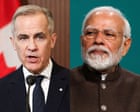

Despite lingering tensions stemming from the 2023 murder plot allegations, Canada and India are reportedly set to enhance their cooperation on terrorism intelligence sharing. This development signifies a step towards rebuilding bilateral relations that have been strained since Canadian officials accused India of orchestrating the killing of a Sikh activist near Vancouver.
According to a recent report, the governments of Canada and India are finalizing a new framework designed to facilitate the exchange of information pertaining to cross-border crimes. This mechanism aims to be more comprehensive and involve higher-level officials compared to previous information-sharing efforts between the two nations. The initial focus will be on collaboration between police forces, with the potential for expansion to include other agencies in the future.
This move towards renewed cooperation comes after a period of significant diplomatic challenges. Following the allegations made by then-Prime Minister Justin Trudeau regarding India's potential involvement in the 2023 assassination, both countries expelled diplomats, reduced visa approvals, and generally downgraded their diplomatic engagement. However, despite these public tensions, behind-the-scenes communication between security establishments reportedly continued, with some level of information exchange maintained.
The impetus for closer collaboration appears to be driven by a mutual recognition of shared security concerns, including transnational crime, terrorism, and extremist activities. For Canada, a particular emphasis will be placed on investigating extra-judicial killings. India, on the other hand, has long expressed concerns about the activities of Khalistani separatist groups operating within Canada, accusing the Canadian government of providing a safe haven for terrorists.
Notably, Prime Minister Narendra Modi is expected to attend the upcoming G7 summit in Canada, where he is scheduled to meet with Canadian Prime Minister Mark Carney. This invitation itself signals a potential shift in Canadian foreign policy, with the new administration seemingly keen on mending ties with countries that experienced strained relations under the previous government. It is anticipated that Modi will raise the issue of pending extradition requests for individuals accused of terrorism and organized crime, many of whom are allegedly associated with Khalistani groups.
While the details of the new intelligence-sharing agreement are still being worked out, it represents a significant step towards normalizing relations between Canada and India. The willingness to cooperate on security matters, despite the unresolved issues surrounding the 2023 murder plot, suggests a pragmatic approach from both sides. Whether this cooperation will lead to a full restoration of trust and diplomatic harmony remains to be seen, but it is undoubtedly a positive development in a complex and evolving relationship. The success of this initiative will likely depend on the transparency and effectiveness of the information-sharing mechanism, as well as the willingness of both countries to address each other's security concerns in a concrete and meaningful way.